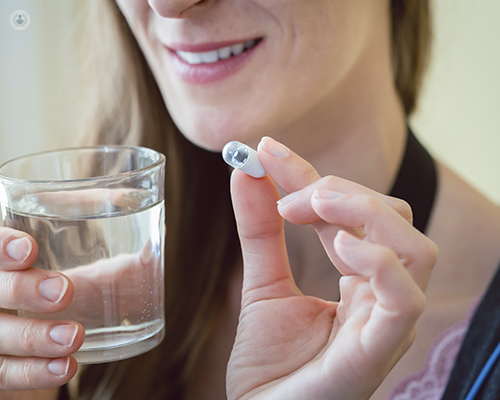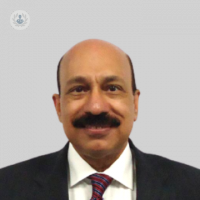Capsule endoscopy procedure, image accuracy and risks
Autore:Capsule endoscopy is a non-invasive examination of your gastrointestinal tract. Most often, a
specific part of your tract will be examined. After reading this comprehensive guide by one of
the earliest capsule endoscopy operators in the world, Dr Waseem Ashraf, you’ll be able to
feel much more prepared for your upcoming capsule endoscopy.

Why have a capsule endoscopy test?
Your consultant will recommend that you have a capsule endoscopy to look at a part of your
intestinal tract. This is the tract that is responsible for the digestion of your food, from the
mouth to the anus. Your consultant may have concluded after evaluating and investigating
your complaint that a capsule endoscopy test will benefit in further management and
treatment of any diagnosed condition.
How do you prepare for the test?
Your practitioner may have already discussed with you the basics of this test. However there
are a few important steps you must take to safely prepare for the procedure.
- Provide your doctor with a complete list of medicines you are taking and you’re your doctor about any allergies you have to drugs or other substance.
- Inform the doctor if you have a pacemaker or any other implanted electro-magnetic devices
- Discuss relevant conditions such as previous abdominal surgery, any swallowing problems (dysphagia) or previous history of bowel obstruction, etc
Although capsule endoscopy is also available for examination of the oesophagus and the colon,
well over 90% of the procedures are carried out for the small bowel. Tests may be carried out
with or without bowel preparation. I prefer to perform capsule endoscopy of the small bowel
without bowel preparation.
You will be required to avoid solids for nearly 16 hours and stop drinking any fluids for up to
8 hours before the procedure. It is preferable not to take any medication for 2 hours before
the test. On the day of the test you are advised to arrive at the specified location where the
consultant or a member of their staff will review the procedure details with you before
conducting the test.
You will normally be provided with written leaflet information well before the date of your
test, which will help you to prepare adequately. If anything is not clear you can always call
before the test and ask for more information.
What happens during the test and how long does it take?
For capsule endoscopy, you have to carry a small recording device which you will wear on a
belt or on a shoulder strap. You will be asked to swallow the capsule, whilst sitting or standing,
with a small amount of water. The doctor or the medical staff conducting the test will confirm
that the capsule is transmitting images to the recorder and you will be free to go home or to
go about your regular routine; you will be given relevant instructions about eating and drinking
and what to expect during the test. You will be asked to return at the conclusion of the test so
that recording equipment can be retrieved. Each capsule is designed for a single use only and
will be naturally eliminated through normal bowel movement. It will not harm the
environment or your household plumbing in any way.
During the test, a small blinking light on the data recorder will confirm that recording is in
progress. If this light stops blinking you may get in touch at an earlier time as the test may
need to be concluded earlier than planned. Normally you will return to us in 10 hours or so
after the procedure started to return the data recorder
Can I eat while the capsule is inside my body?
You will normally be allowed to drink and have a light snack four or five hours after you
swallow the capsule. If there is any exception then you will be advised otherwise. We normally
advise not to eat or drink anything red or black before and during the test.
How accurate and clear are the Images?
The capsule used is a video capsule, meaning that it contains a miniature camera with a light
source and battery to perform a painless examination of your gastrointestinal tract. Multiple
images are captured every second as the pill cam travels down the gastrointestinal tract. These
are transmitted through Bluetooth technology to the data recorder, which you carry on your
person. The battery life of the capsule is between 11 and 12 hours, after which the recording
stops. The battery life is slightly longer in capsules used to examine the colon because it
requires a longer recording time.
This is a live-recording hence the images are an accurate representation. A clear bowel,
especially with no food and very little water in the intestine, allows the capsule to capture
clear images. Although most recordings are of reportable quality with relatively clear images,
there are occasions when the intestine is not very clean, for various reasons. Only rarely,
repeat examination may be required.
Can you go home during the procedure?
The nature of the procedure is that once you have swallowed the capsule and the images are
correctly being transmitted to the recorder, you are allowed to leave for the 11 to 12-hour
duration and are advised of a return time when the test is concluded.
How are the results interpreted?
After the procedure, and once you have returned the data recorder to the practice, the data
will be downloaded from the recorder onto a hardware device and subsequently viewed as a
video and reported on by the consultant. A report can usually be provided within a couple of
days after the procedure.
In my practice, I usually view the video twice, so as to minimize the chances of missing any
findings. Since there is a fair length of the recording to look at and to report, I tend to do my
reporting over the weekends unless it is urgent.
The risk to the patient
Capsule endoscopy is a relatively safe procedure. However there are a few side effects that are
reported. The most common and relevant being capsule retention and this is when a capsule
becomes stuck in the digestive tract, usually due to a blockage or narrowing of the intestine. If
that happens then usually nothing needs to be done and the capsule becomes unstuck by itself
and passes naturally. However, on rare occasions, a deep enteroscopy or surgery may be
required to retrieve the capsule.
Capsules only become stuck in an abnormal area of the gastrointestinal tract which, sooner or
later, may have required surgery anyway. If this complication happens, it can mean that not
only will a diagnosis of blockage be made at an earlier date, but that there are also pictures to
look at to understand the nature of the obstruction.
There are extremely rare reports of having trouble swallowing after the beginning of the
study. Some patients have reported experiencing chest or abdominal pains which may or may
not be related to the ingestion of capsule. Patients requiring MRI (magnetic resonance
imaging) examination around the same time may not undergo a capsule endoscopy procedure
until the MRI examination has been completed.
Who should not undergo capsule endoscopy procedure?
It is important to remember that capsule endoscopy is one of the safest gastrointestinal
procedures and most people can undergo the procedure without any concern. However, it is
recommended that the following types of patients should avoid undergoing a capsule
procedure:
- Patients with severe swallowing difficulties (dysphagia).
- Patients with confirmed intestinal obstruction or significant obstructive symptoms.
- Patients requiring an MRI procedure, either during the course of the study or immediately after.
Patients who fail to swallow the capsule at the time of examination. However, if there
are no other issues then the capsule can be preloaded onto a gastroscope and
released into the upper intestine directly and therefore, not requiring the patient to
swallow it. This is very rare though and may be more of an issue with small children.
Dr Waseem Ashraf is a highly experienced Gastroenterologist with a particular interest in
Endoscopic Diagnostics and Endoscopic Treatments among other areas of Gastroenterology.
Visit his profile to learn how he can help you with your gastroenterology needs.


